To detect sewer gas leaks in your home, look for the strong smell of rotten eggs or sulfur near drains, toilets, or floor traps, especially after running water. Check for visual signs like foggy areas, cracks, or bubbles in toilets. Use DIY methods like soapy water on suspect pipes or a gas detector to identify leaks. Proper ventilation helps, but if odors persist, contacting a professional guarantees safe, thorough inspection. If you’re curious about more tips, keep exploring.
Key Takeaways
- Recognize foul odors like rotten eggs around drains, toilets, or floor traps, especially after running water.
- Use soapy water spray on suspected pipes; bubbling indicates a leak.
- Check for visual clues such as foggy areas, dark stains, or cracks near plumbing fixtures.
- Ensure proper ventilation by opening windows and exhaust fans to disperse gases and detect odors early.
- If odors persist despite ventilation, contact a professional plumber for thorough inspection and safe repairs.
Recognizing the Odor of Sewer Gas
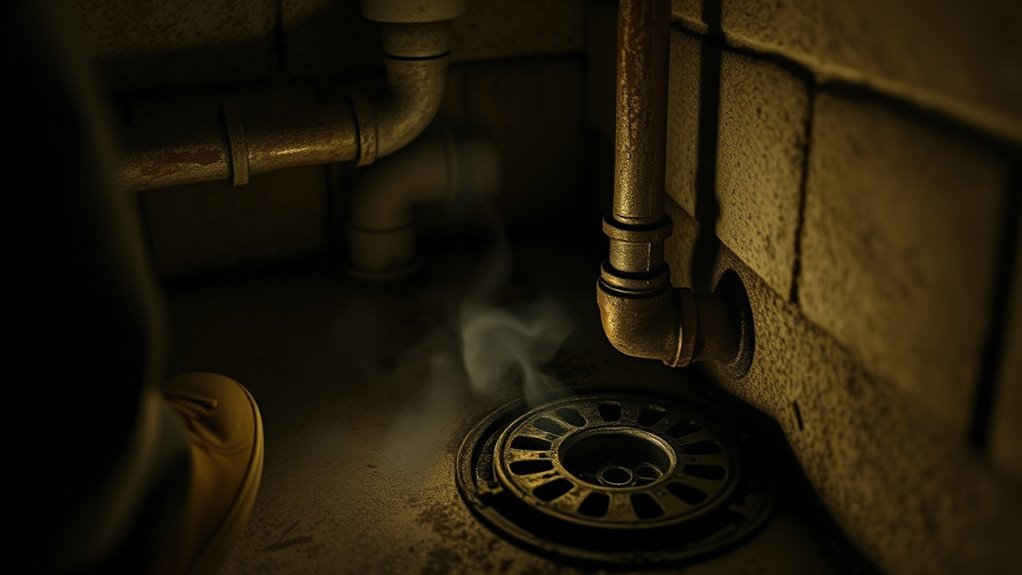
Sewer gas has a distinctive smell that can alert you to leaks or problems in your plumbing system. It often smells like rotten eggs or sulfur, which is caused by hydrogen sulfide in the gas. This odor can be strong and persistent, especially near drains, toilets, or floor traps. You might notice the smell worse after running water or using appliances that drain into your sewer system. Keep in mind, this odor isn’t just unpleasant; it can also indicate a potential hazard. If you detect this smell, don’t ignore it. Take immediate steps to identify the source and ventilate the area. Recognizing this odor early helps prevent potential health issues and costly repairs down the line. Proper ventilation can help disperse accumulated gases and improve safety.
Common Household Indicators of a Leak
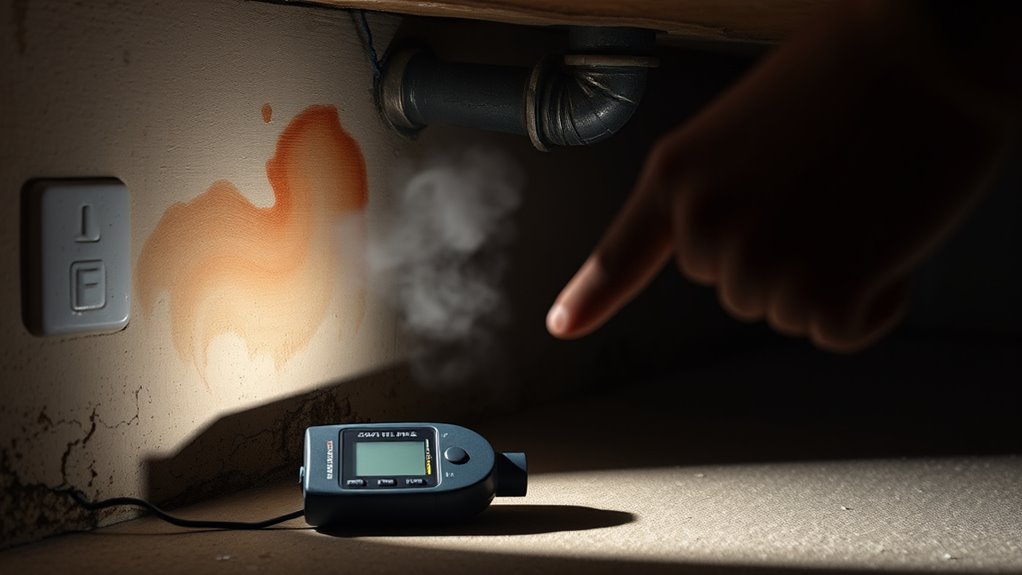
If you notice persistent unpleasant odors around your home, it could be a sign of a sewer gas leak. You might also see an increase in pests like flies or roaches, which are attracted to the smell. Keep an eye out for these signals—they often indicate a leak that needs prompt attention. Additionally, unusual odor quality or changes in the smell’s intensity can help identify potential sewer gas issues early.
Unpleasant Odors Persisting
Unpleasant odors that linger in your home can be a strong sign of a sewer gas leak. If you notice a persistent, foul smell that doesn’t go away, it’s time to investigate. Sewer gas contains compounds like sulfur, which produce a rotten egg smell, making your living space uncomfortable. These odors often seem strongest near drains, toilets, or floor areas where pipes run. Unlike temporary smells from cleaning products or trash, these odors don’t fade with ventilation. If you find yourself constantly battling an unpleasant smell even after cleaning or airing out, it could indicate a leak or ventilation issue within your plumbing system. Addressing this promptly can prevent potential health hazards and costly repairs down the line. Recognizing household indicators of a leak early can help mitigate extensive damage and ensure your home’s safety.
Unusual Pest Activity
Have you noticed an increase in pests like cockroaches, drain flies, or ants around your home? These insects are often attracted to the damp, decaying environment created by a sewer gas leak. Drain flies, in particular, thrive in moist areas with organic buildup, such as sinks, drains, or floor drains. Cockroaches and ants may also invade your space searching for food and moisture. If you see a sudden surge in these pests, it could indicate a hidden leak or sewer problem. Their presence isn’t just a nuisance; it signals that something’s off with your plumbing or sewer lines. Addressing this pest activity promptly can help you identify and fix the leak before it causes further damage or health issues. Recognizing the signs of sewer gas leaks early can prevent costly repairs and health hazards.
Visual Clues to Sewer Gas Leaks
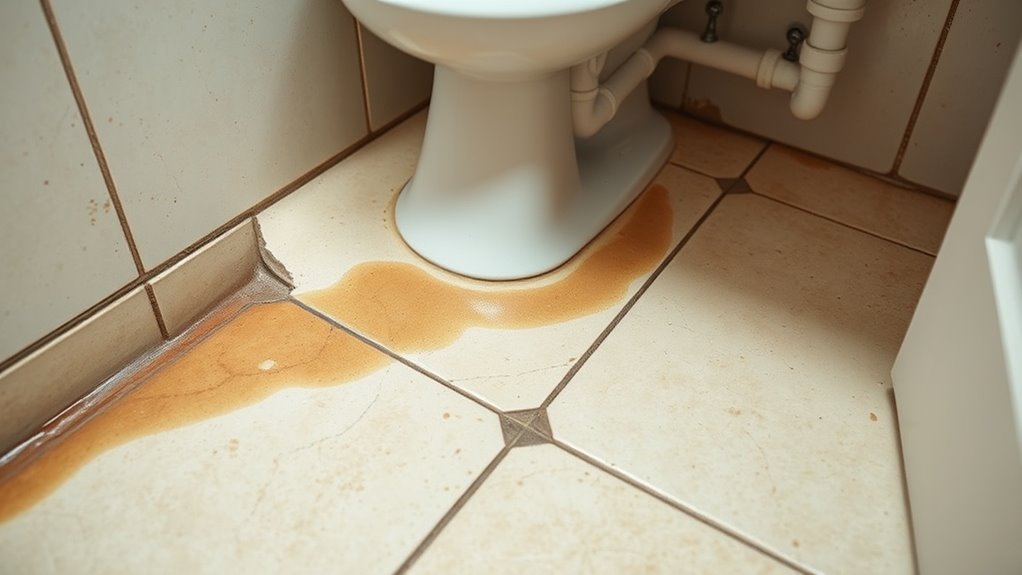
You might notice an unusual odor lingering in your home, which can signal a sewer gas leak. Keep an eye out for visible signs like foggy or discolored areas around drains and pipes. Spotting these clues early helps you address the problem before it worsens. Being aware of pinball machine weights can also help when moving or inspecting appliances in your home.
Unusual Odor Presence
When sewer gas leaks occur, one of the most immediate signs is an unusual odor that seems to linger or intensify unexpectedly. You might notice a sharp, rotten smell often described as sulfur or rotten eggs. This odor can permeate your home, especially near drains, bathrooms, or the basement. Sometimes, the smell worsens after using plumbing fixtures or when vents are blocked. If you detect a persistent, foul odor that doesn’t go away with ventilation, it’s a strong indicator of a leak. Keep in mind, sewer gas odors can be subtle at first, but they tend to become more noticeable over time. Trust your nose—an unusual, strong smell is a key sign that you should investigate further. Proper ventilation and inspecting your plumbing system can help reduce the risk of dangerous sewer gas buildup.
Visible Gas Leakage
Are there visible signs that indicate a sewer gas leak? You might notice a persistent fog or haze near drains or vents. Cracks or stains on walls, floors, or ceilings could also reveal the presence of escaping gas. Sometimes, bubbles or foam appear in your toilet or nearby water features. To help visualize, here’s what you might see:
| Sign | Description |
|---|---|
| Fogginess near drains | A mist or haze around sinks or floor drains |
| Cracks or stains in walls | Dark stains or cracks where gas may escape |
| Bubbles in water | Foamy bubbles in toilets or floor drains |
Look for these clues—visible signs can point to dangerous leaks before odors become overwhelming. Being aware of gas leaks helps in taking prompt action to ensure home safety.
Testing for Sewer Gas Presence

Testing for sewer gas presence involves using specialized detectors to identify the characteristic odors and dangerous gases like hydrogen sulfide and methane. These detectors are sensitive instruments that can detect even low concentrations of hazardous gases, alerting you to potential leaks. When testing, ensure the detector is calibrated correctly and placed near suspected problem areas, such as drains, vents, or sewer lines. Pay attention to abnormal readings or unusual smells, as these indicate the presence of sewer gases. Visual cues like fogging or persistent odors can also guide your inspection. Remember, accurate testing is vital for safety; if you detect any signs of sewer gas, avoid entering the area and consult a professional immediately. Proper testing helps prevent health issues and property damage. Additionally, understanding ventilation procedures can help improve safety during inspection and reduce gas buildup.
Using DIY Methods to Detect Gas Leaks
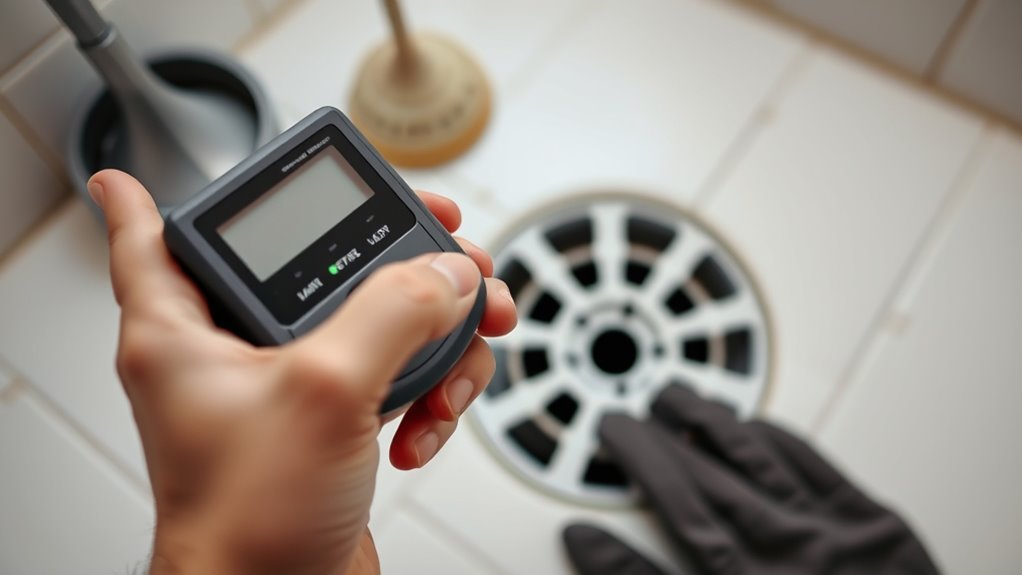
If you suspect sewer gas leaks but don’t have access to professional detectors, there are simple DIY methods you can try to identify potential problems. One effective approach is to use a soapy water solution. Spray it around suspect pipes and fixtures; bubbling indicates leaks. You can also listen carefully for unusual sounds like hissing or gurgling, which may signal leaks. Additionally, smell for strong, foul odors near drains or vents. To help organize your observations, consider this quick reference:
| Method | What to Look For | Tools Needed |
|---|---|---|
| Soapy Water | Bubbles forming | Dish soap & spray bottle |
| Sound Test | Unusual noises | Your ears |
| Odor Check | Strong foul smell | Your nose |
These simple steps can help you spot leaks early before they worsen. Regularly monitoring your plumbing system can prevent more serious issues down the line.
The Role of Ventilation in Leak Detection
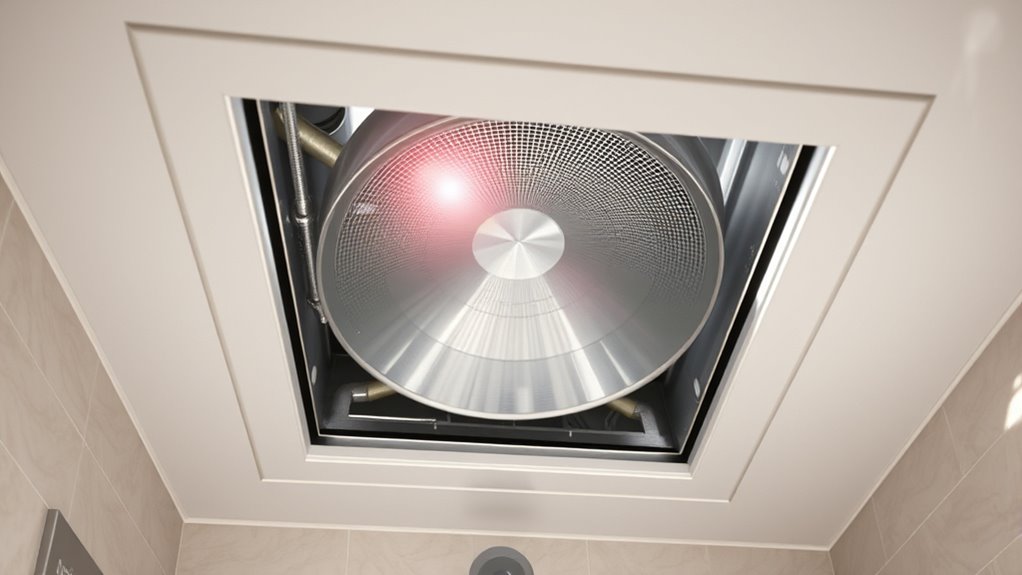
Proper ventilation plays an essential role in detecting sewer gas leaks because it helps disperse accumulated gases, making it easier to notice odors or signs of leaks. When your home is well-ventilated, sewer gases don’t linger in confined spaces, reducing false negatives. Opening windows or using exhaust fans increases airflow, which helps carry odors outside and prevents gases from building up unnoticed. This process allows you to identify potential leaks more quickly, as strong or unusual smells become more apparent. Good ventilation also prevents the buildup of dangerous gases, protecting your health while you investigate. Additionally, understanding emotional support can help homeowners cope with the stress of home maintenance issues, including leaks. Remember, consistent airflow is key—regularly airing out your home can make a significant difference in early leak detection and overall safety.
When to Call a Professional Plumber
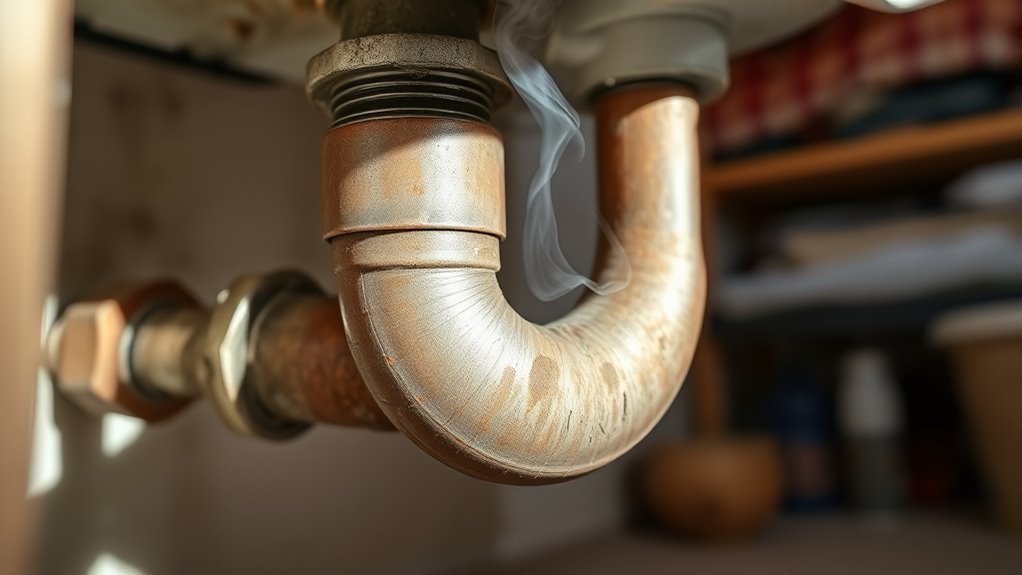
While good ventilation can help you detect sewer gas leaks early, there are moments when the smell or signs become too faint or persistent to handle on your own. If you notice a strong, lingering odor despite ventilating the area, it’s time to call a professional plumber. Persistent smells may indicate a hidden leak or a more serious issue in your sewer line that requires specialized equipment and expertise. Additionally, if you experience symptoms like headaches, dizziness, or nausea regularly when near plumbing fixtures, don’t delay—consult a professional promptly. Attempting to fix complex sewer gas problems without proper training can worsen the situation or pose health risks. Trust a licensed plumber to diagnose, repair, and ensure your home’s safety.
Preventative Measures to Avoid Sewer Gas Leaks
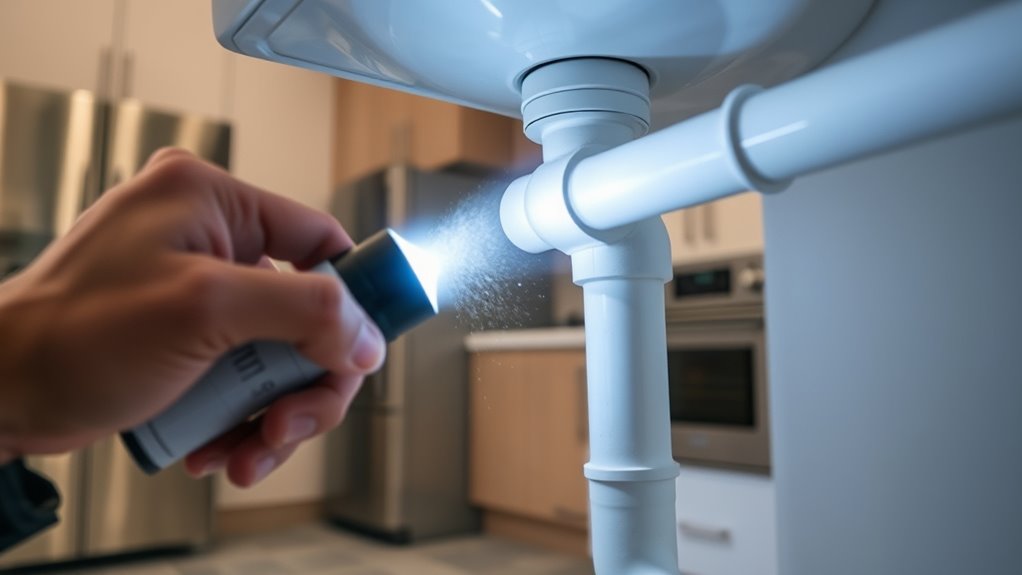
Taking proactive steps can markedly reduce the risk of sewer gas leaks in your home. Begin by regularly inspecting plumbing fixtures and seals, replacing any cracked or dried-out gaskets. Ensure that all drain covers are secure and properly fitted to prevent gases from escaping. Avoid flushing non-degradable items that can cause blockages, which increase pressure and potential leaks. Keep vents clear of debris or obstructions to allow proper airflow and prevent gas buildup. Installing vent filters or traps can also help contain sewer gases. Additionally, consider scheduling routine professional inspections to catch minor issues before they become serious. By maintaining your plumbing system and addressing small problems early, you minimize the chances of leaks and safeguard your home’s air quality.
Maintaining Your Home’s Plumbing System
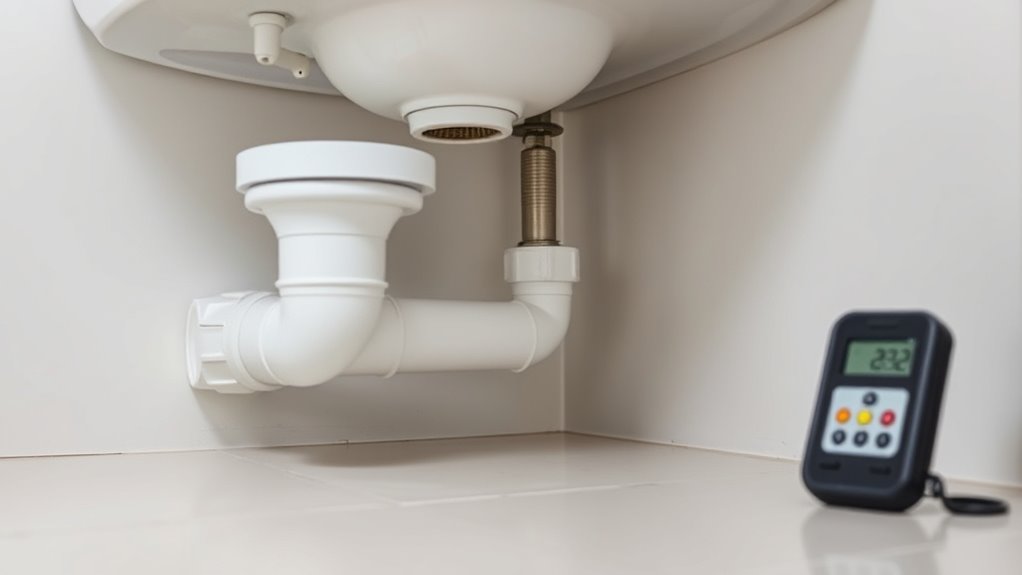
Regularly maintaining your home’s plumbing system is essential to prevent sewer gas leaks and guarantee everything functions smoothly. By staying proactive, you reduce the risk of unpleasant odors and costly repairs. Here’s what you should focus on:
Regular plumbing maintenance prevents odors, leaks, and costly repairs. Stay proactive for a smoothly functioning home.
- Check for leaks around pipes and fixtures regularly to catch issues early.
- Clean drain traps and vents to ensure proper airflow and prevent buildup.
- Inspect your sewer line for blockages or damage, especially if you notice slow drains or backups.
Frequently Asked Questions
Can Sewer Gas Leaks Cause Health Issues in My Home?
Yes, sewer gas leaks can cause health issues in your home. The gases, including methane and hydrogen sulfide, can lead to headaches, dizziness, respiratory problems, and nausea if you’re exposed over time. In severe cases, they can cause suffocation or explosions. It is crucial to detect and fix leaks promptly to protect your family’s health and guarantee your home stays safe. Regular inspections and proper ventilation help prevent these risks.
Are There Specific Household Materials That Attract Sewer Gas Leaks?
Certain household materials can make sewer gas leaks more noticeable or likely. For example, flexible rubber or plastic seals around pipes or fixtures can degrade over time, allowing gases to escape. Organic materials like hair, grease, or soap scum can clog drains and cause backups, increasing the chance of leaks. Regularly inspecting and maintaining your plumbing, and replacing worn materials, helps prevent sewer gases from escaping into your home.
How Often Should I Inspect My Plumbing for Potential Leaks?
Did you know that most household leaks go unnoticed for months, causing costly damage? You should inspect your plumbing at least twice a year to catch potential leaks early. Regular checks include looking for water stains, mold, or foul odors. Don’t forget to test your sump pump and check under sinks. Staying proactive helps prevent sewer gas leaks, saving you money and keeping your home safe and healthy.
Can Sewer Gas Leaks Affect My Home’S Indoor Air Quality Long-Term?
Sewer gas leaks can seriously impact your home’s indoor air quality over time. If you ignore them, you might notice persistent odors, headaches, or respiratory issues. These gases contain harmful substances like methane and hydrogen sulfide, which can cause health problems if you’re exposed long-term. You should address leaks promptly by inspecting your plumbing regularly, ensuring vents are clear, and calling a professional if you suspect a leak to protect your home’s air quality.
What Are the Safety Precautions When Using Chemical Testers for Leaks?
When using chemical testers for leaks, you should always wear protective gear like gloves and goggles to prevent skin and eye irritation. Make certain good ventilation in the area to avoid inhaling fumes, and follow the manufacturer’s instructions carefully. Keep a fire extinguisher nearby, and avoid smoking or open flames during testing. If you’re unsure or uncomfortable, consider hiring a professional to handle the process safely.
Conclusion
By staying vigilant and acting swiftly, you can catch sewer gas leaks before they become a catastrophe. Regular inspections and proper ventilation are your best allies, turning your home into a modern-day fortress against unseen dangers. Remember, even in this age of technology, some issues still call for the wisdom of an old-world plumber. Don’t wait for a “Dewey Decimal” moment—trust your senses and keep your home safe and sound.









